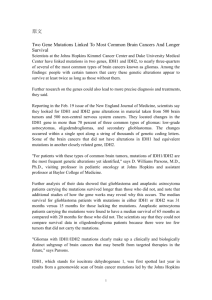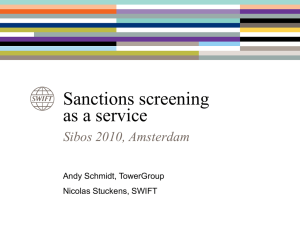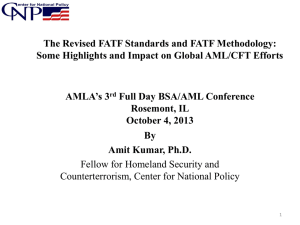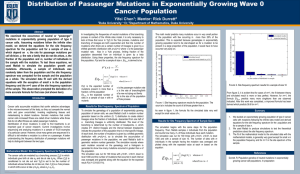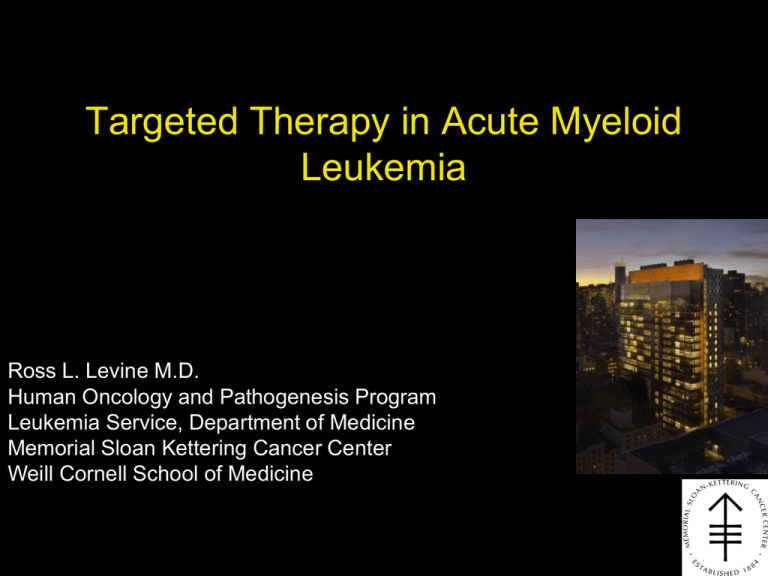
Targeted Therapy in Acute Myeloid
Leukemia
Ross L. Levine M.D.
Human Oncology and Pathogenesis Program
Leukemia Service, Department of Medicine
Memorial Sloan Kettering Cancer Center
Weill Cornell School of Medicine
Acute Myeloid Leukemia Remains Associated with
Poor Overall Survival
Even with intensive induction chemotherapy/transplantation most
patients die of their disease new insights are needed
Issa, Kantarjian et al, Cancer 2008
Mutational Analysis of AML Has Identified Many New
Classes of Mutations
DNA
Methylation
Chromatin
State
TCGA AML NEJM 2013
IDH1 Mutations in AML*
Whole genome sequencing identified somatic IDH1 mutation->seen in 8% of
187 additional samples
*Mardis et al NEJM 2009
IDH1 mutations acquire a novel enzymatic function
• Metabolomic profiling found
that IDH1 mutant allele
expression resulted in
production of 2hydroxyglutarate, an aberrant
metabolite
• IDH1 mutant cancers produce
a vast excess of 2HG
• Leukemias
• Brain Tumors
• Pancreatic Cancer
• Sarcomas
• Many others
Dang et al. Nature 2009
IDH2 mutations in AML
• Elevated 2-HG levels in IDH1wildtype patients led to discovery of
IDH2 mutations in AML in patients
from ECOG and Alliance Cooperative
Group Trials
• The overall incidence of IDH1/2
mutations is 15-30%, most common
in older patients, normal karyotype
• However, it was not known HOW
these mutations contribute to AML or
other cancers
Ward et al. Cancer Cell 2010
Marcucci et al JCO 2010
Gross et al. J Ex Med 2010
Human genetics is always right: using mutational
studies to elucidate AML pathogenesis
By profiling primary patient samples we can improve our
understanding of AML biology
We hypothesized that we could elucidate the function of IDH
mutations in AML by identifying mutations exclusive of IDH
mutations of AML
ECOG 1900 Cohort: IDH1/2 mutations mutually
exclusive of TET2 mutations
Figueroa, Abdel-Wahab, Lu et al, Cancer Cell 2010
Mutations in IDH1/2 and TET2 lead to impaired DNA
Hydroxymethylation and Increased DNA Methylation
Isocitrate
Wildtype
IDH1/2
a-ketoglutarate
MUTANT
IDH1/2
2-hydroxyglutarate
Can these mutations be therapeutically targeted?
Figueroa, Abdel-Wahab, Lu et al, Cancer Cell 2010
Development of Specific inhibitors of IDH1/2*
- Small molecule inhibitors of IDH2 and IDH1 have been developed with potent,
specific on target effects
- In vitro and in vivo assays in mouse models and patient samples show significant
efficacy alone and in combination with other AML therapies
- Led to first-in-man clinical trials of AG-221, IDH2-specific inhibitor in
relapsed/refractory IDH2-mutant AML (Eytan Stein, PI)
*Kate Yen/Agios, Alan Shih
Efficacy of IDH2 Inhibitor AG-221 in Relapsed/Refractory AML
C1
C2
C3
C4
CR
C5
C6
Transplant
CRp
30 MG
BID
C7
Bone Fracture,
Death Unrelated
CR
PR
CR*
On Study
Off Study
CR
50 MG
BID
PR
Response
Bone Marrow
CRi
CR**
75 MG
BID
100 MG
QD
PR
CR
Significant clinical activity in AML patients with IDH2
mutations (required for enrollment)
•
PD studies show target inhibition at doses which show
efficacy
•
Evidence of differentiation in vivo with neutrophil
expansion followed by clinical response
CRp
100 MG
BID
150 MG
QD
•
PR
PR
Stein et al. AACR, 2014; Agresta et al. EHA, Milan, 2014
Conclusions
• Genome sequencing of AML patients can identify novel, clinically
important mutations
• Can use these data to improve our understanding of AML biology
• Can lead to the development of novel, molecularly targeted
therapies
Acknowledgements
Levine Lab
• Alan Shih
• Kaitlyn Shank
• Jay Patel
ECOG
• Elisabeth Paietta
• Robert Comis
MSKCC
• Craig Thompson
• Eytan Stein
• Kristina Knapp
• Omar Abdel-Wahab
• Scott Armstrong
• Marty Tallman
• Scott Lowe
Cornell
• Ari Melnick
• Chris Mason
Michigan
• Ken Figueroa
NYU
• Iannis Aifantis
Chicago
• Chuan He
• Lucy Godley
Einstein
• Uli Steidl
• Laura Barreyo
• Ileana-Antony Debre
Agios
• Kate Yen
• Sam Agresta
• David Scheikein
• Funded by National Cancer Institute


